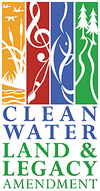
Difference between revisions of "Main Page"
m |
|||
| Line 26: | Line 26: | ||
==What's new - Recent updates== | ==What's new - Recent updates== | ||
| − | To view recent content changes or anticipated changes in the near future, see [[What's New]] (left toolbar). The What's New page only contains important changes or notifications and will therefore be updated infrequently. | + | To view recent content changes or anticipated changes in the near future, see [[What's New]] (left toolbar). The What's New page only contains important changes or notifications and will therefore be updated infrequently. . |
==Submitting comments on the website== | ==Submitting comments on the website== | ||
Revision as of 20:59, 8 July 2015
Welcome to the Minnesota Stormwater Manual website. The Manual is designed to be user-friendly and flexible to guide users directly to the information they need, depending upon the question they need to answer or Best Management Practice (BMP) they need to design. This website was developed in an interactive wiki format to make it easy for the user to get to the subject of interest and to move between subjects.
You can access the Manual Table of Contents by clicking on the link below.
Contents
What's new - Recent updates
To view recent content changes or anticipated changes in the near future, see What's New (left toolbar). The What's New page only contains important changes or notifications and will therefore be updated infrequently. .
Submitting comments on the website
To submit feedback,scroll down to Help improve this page, located at the bottom of any given page in the website. Type your comments in the text box and submit. We will attempt to provide comments to technical questions. To see responses, click here. By posting, you agree to transparency under these terms.
Acknowledgements
This Manual was initiated by the Minnesota Stormwater Design Team, which evolved into the Minnesota Stormwater Steering Committee (SSC). Manual production was directed by the SSC’s Manual Sub-Committee (MSC). A listing of contributors and participants in the process appears in the Acknowledgements section.
Guidance on use of the website
For new users of this website, we have provided Guidance on how to use this website and the Manual.
Overview
Throughout the production of the Manual, one singular goal was kept in mind – to produce a useful product that helps the everyday user better manage stormwater. The purpose, goal, vision and tenets were developed by the original Stormwater Design Team. Although stormwater management to control the pollution of receiving waters has been around in earnest for over 30 years in Minnesota, the advent of many new programs means that guidance is needed more than ever. Such programs as the NPDES (National Pollutant Discharge Elimination System) Phase I and II program, the TMDL (Total Maximum Daily Load) program, and strong runoff control programs at the local and watershed levels have all contributed to the need for this information to be compiled in a comprehensive, technically sound document.
The directive the Manual Sub-Committee received from the SSC was to produce a document that could be used as a single source to guide stormwater managers through the maze of regulations, Best Management Practices (BMPs) designs, models/techniques and terminology that constitute good stormwater management. It does not address the requirements of other non-stormwater related regulatory programs that can have an effect on stormwater. Related to this was the charge to produce a Manual that does not duplicate the many good sources of information already available. Because Minnesota is fortunate enough to have had many additional tools created over the years, the Manual will often forego detailed explanation of a particular element and send the user directly to another resource via electronic linkage or cited reference. These linked resources provide information that Minnesota stormwater managers can put to use in conjunction with this Minnesota Stormwater Manual. The Manual is intended to be flexible, easily updated and responsive to the needs of the Minnesota stormwater community.
Disclaimer
The Minnesota Pollution Control Agency (MPCA) (including its employees and agents) assumes no responsibility for consequences resulting from the use of information contained within this Internet website, or from use of information obtained at linked Internet addresses, or in any respect for the content of such information, including (but not limited to) errors or omissions, the accuracy or reasonableness of factual or scientific assumptions, studies or conclusions, the defamatory nature of statements, ownership of copyright or other intellectual property rights, and the violation of property, privacy, or personal rights of others. The MPCA is not responsible for, and expressly disclaims all liability for, damages of any kind arising out of use, reference to, or reliance on such information. No guarantees or warranties, including (but not limited to) any express or implied warranties of merchantability or fitness for a particular use or purpose, are made by the MPCA with respect to such information.
At certain places on this MPCA Internet site, live "links" to other Internet addresses can be accessed. Such external Internet addresses contain information created, published, maintained, or otherwise posted by institutions or organizations independent of the MPCA. The MPCA does not endorse, approve, certify, or control these external Internet addresses and does not guarantee the availability, accuracy, completeness, efficacy, timeliness, or correct sequencing of information located at such addresses. No one should rely on the accuracy, completeness, efficacy, and timeliness of such information. Reference therein to any specific commercial product, process, or service by trade name, trademark, service mark, manufacturer, or otherwise does not constitute or imply endorsement, recommendation, or favoring by the MPCA.
